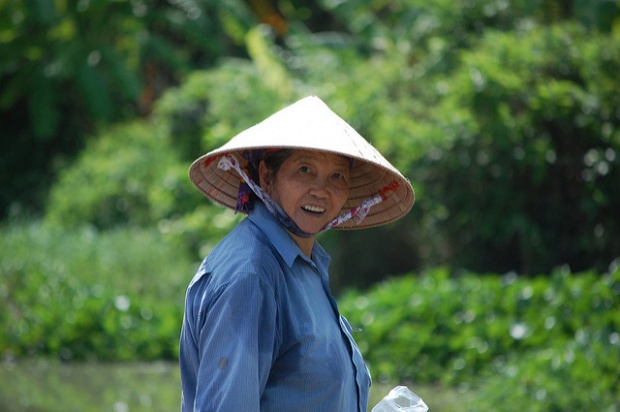Partnership for a Resilient and Secure Food System in Vietnam
This is an an abbreviated version of a piece originally posted on the website of a partner organization, the CGIAR Research Program on Climate Change, Agriculture and Food Security (CCAFS). Read the full piece here.
With a coastline spanning 3,260 kilometers, Vietnam is highly vulnerable to the impacts of climate change, such as sea level rise, salt water intrusion impacting soil salinity, increasing extreme weather event severity and frequency, and climate variability. According to 2017 data, agriculture, forestry, and fishery account for roughly 15% of Vietnam’s total Gross Domestic Product (GDP). But while Vietnam is poised to achieve its goal of becoming a developed country by 2020, climate change impacts on the country’s agricultural sector could prove devastating to its 20 million farmers as well as its economy, food security, and health.

A woman rice farmer in the Mekong Delta region, Vietnam, where the International Rice Research Institute (IRRI) is leading work on adaptation of rice-based cropping systems. Photo: V. Meadu (CCAFS). (view original)
The IRI-led Columbia World Project (CWP), Adapting Agriculture to Climate Today, for Tomorrow (ACToday), addresses this risk in Vietnam and 5 other target countries. By enhancing the availability and effectiveness of climate information in national policy, planning, management, and other decision-making processes, ACToday aims to improve food security, nutrition, environmental sustainability, and economic outcomes in developing countries.
The CGIAR Research Program on Climate Change, Agriculture and Food Security (CCAFS), which is already leading ongoing projects on agricultural research and climate services for farmers in Vietnam, is an ACToday partner. According to James Hansen, IRI Senior Research Scientist and leader of the CCAFS Flagship on Climate Services and Safety Nets, ongoing partnership with the IRI has enabled CCAFS to increase both demand- and supply-side capacity to deliver useful climate information and services tailored to farmers’ needs. CCAFS’ research on agriculture and food security in the face of climate change has enabled better understanding and practice of climate services for the agricultural sector from the demand side. Meanwhile, the IRI is a recognized expert on climate research and climate services from the supply side.
An ACToday planning workshop organized by IRI in Hanoi, Vietnam, at the beginning of the week gathered participants from the Vietnam Ministry of Agriculture and Rural Development (MARD), Vietnam Department of Agriculture at the provencial level, Vietnam National Meteorological-Hydrological Administration (VNMHA), and Vietnam Institute for Meteorology, Hydrology and Climate Change (IMHEN). Dr. Nguyen Hong Son, President of the Vietnam Academy of Agricultural Sciences (VAAS) and Director General of the Crop Production Department at MARD delivered the opening remarks. Project leaders the International Rice Research Institute (IRRI), the International Center Tropical Agriculture (CIAT), and World Agroforestry Centre (ICRAF) also participated in the workshop.
The workshop, as well as additional meetings with Dr. Le Quoc Doanh, Vice Minister of MARD, and with relevant government agencies, allowed CCAFS, IRI, and partners to understand Vietnam’s needs in terms of climate forecasts and tailored forecast products. This understanding then enabled ACToday partners to identify the most pressing, concrete, actionable activities for the project in Vietnam.
Using the Enhancing National Climate Services (ENACTS) approach developed by the IRI, ACToday will work with Vietnam’s national meteorological administration and research entities to create new, quality-controlled data sets and improve their access and use. This first step would provide the foundation to support the current and upcoming climate services work by CCAFS and other partners in the country.

You must be logged in to post a comment.